SPOTLIGHT 💡🔦

When Water Becomes a Space for Black Men to Heal
Toronto-based director and screenwriter, Tyler McKenzie Evans (@ntylrevns), wanted to make his newest short film, Sea Star, after a conversation with his dad. He was surprised when his father told him that he had never learned to swim despite putting him and his brother in swimming lessons.
Sixty-four percent of Black children cannot swim. Two in three Black adults have never taken a swimming lesson. Black adolescents are seven times more likely to drown in public pools than their white peers. -Centers for Disease Control and Prevention
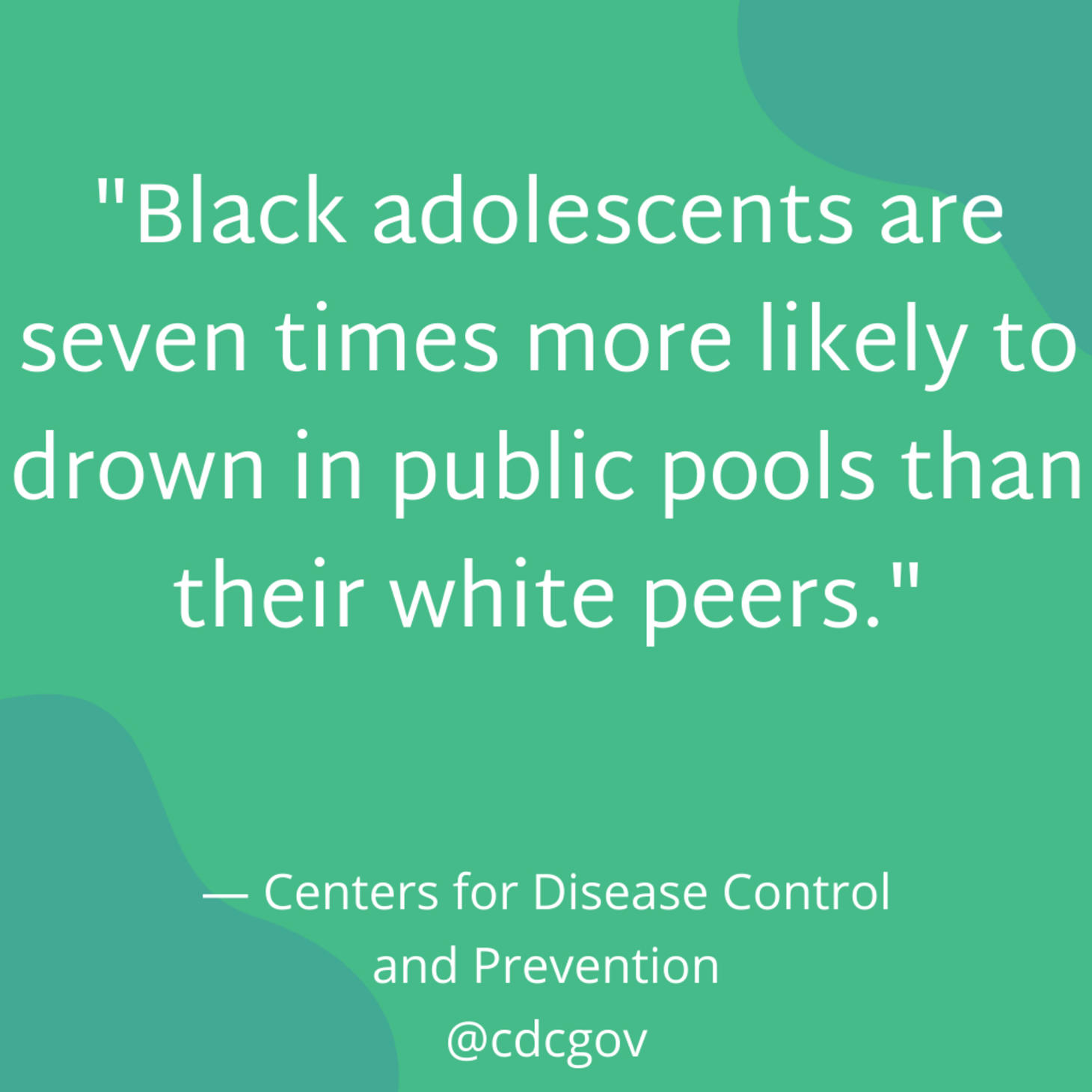
Sea Star, which premiered at TIFF in 2025, is Evans' most personal film. He dedicates the film "to all the reticent Black men in my life and Black people's relationship with water."
Sea Star follows Chris, played by John Phillips, an older Black man as he takes his first swimming lesson with a group of kids while dealing with personal hardship. The film explores grief, fear, and quiet resilience to face long-standing fears, using water as both literal and metaphorical space for healing.

Water as Silent Narrator
Water is a powerful symbol in storytelling. It often represents renewal, cleansing, and rebirth. But in Sea Star, water means something else. It's tied to deep fear and painful memories. The male character has spent his whole life avoiding swimming, and it's about more than just personal anxiety. It's about a broader cultural story, shaped by exclusion and systemic inequality.
Toronto-based scholar, writer, and activist Jacqueline L. Scott specializes in race, nature, and trauma. In 2018, she wrote an article called "Swimming While Black". She argues not knowing how to swim isn't only about lacking skills but that it's tied to racial and economic inequality, and to trauma. The numbers back this up. Black men drown at much higher rates than white men.
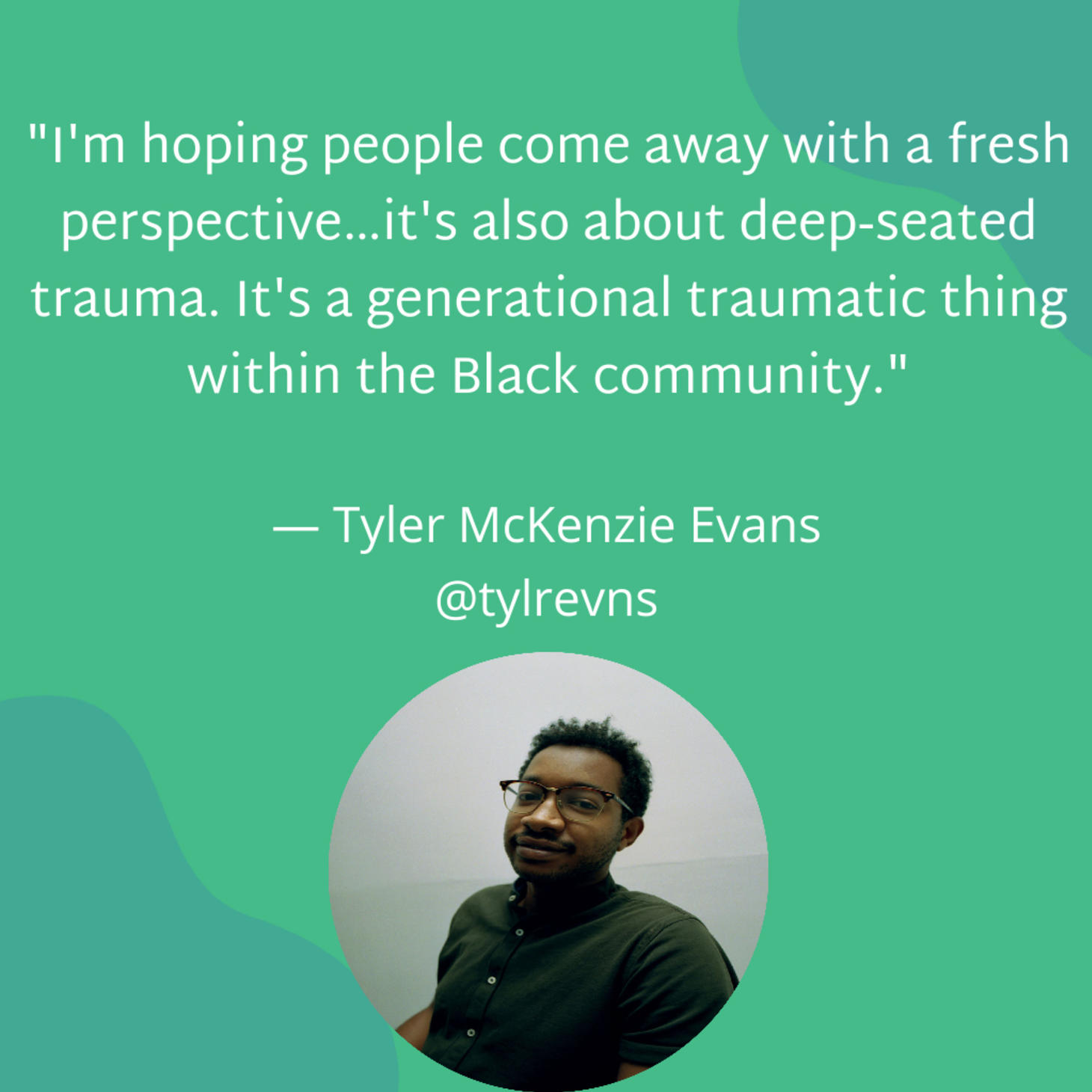
Spinning Forward spoke with director and screenwriter, Tyler McKenzie Evans, about Sea Star
Evans describes water as a silent narrator in the film. “I’m hoping people come away with a fresh perspective…it’s also about deep‑seated trauma," he said, "It’s a generational traumatic thing within the Black community.”
The film excels because of Evans' decision to work with constraints. Rather than make a "trauma-filled film with dialogue”, Evans wanted to tell a more tender story relying on visual language and performance. Emotion was expressed through gesture, stillness, and expression. John Phillips was cast as the lead because "his eyes say so much without him having to say anything."
“When I was writing the script, I really wanted to challenge myself and kind of use…performance and visual language to tell the story rather than dialogue," he said. "I made sure to pull back any dialogue that I could and have as few words spoken as possible.”
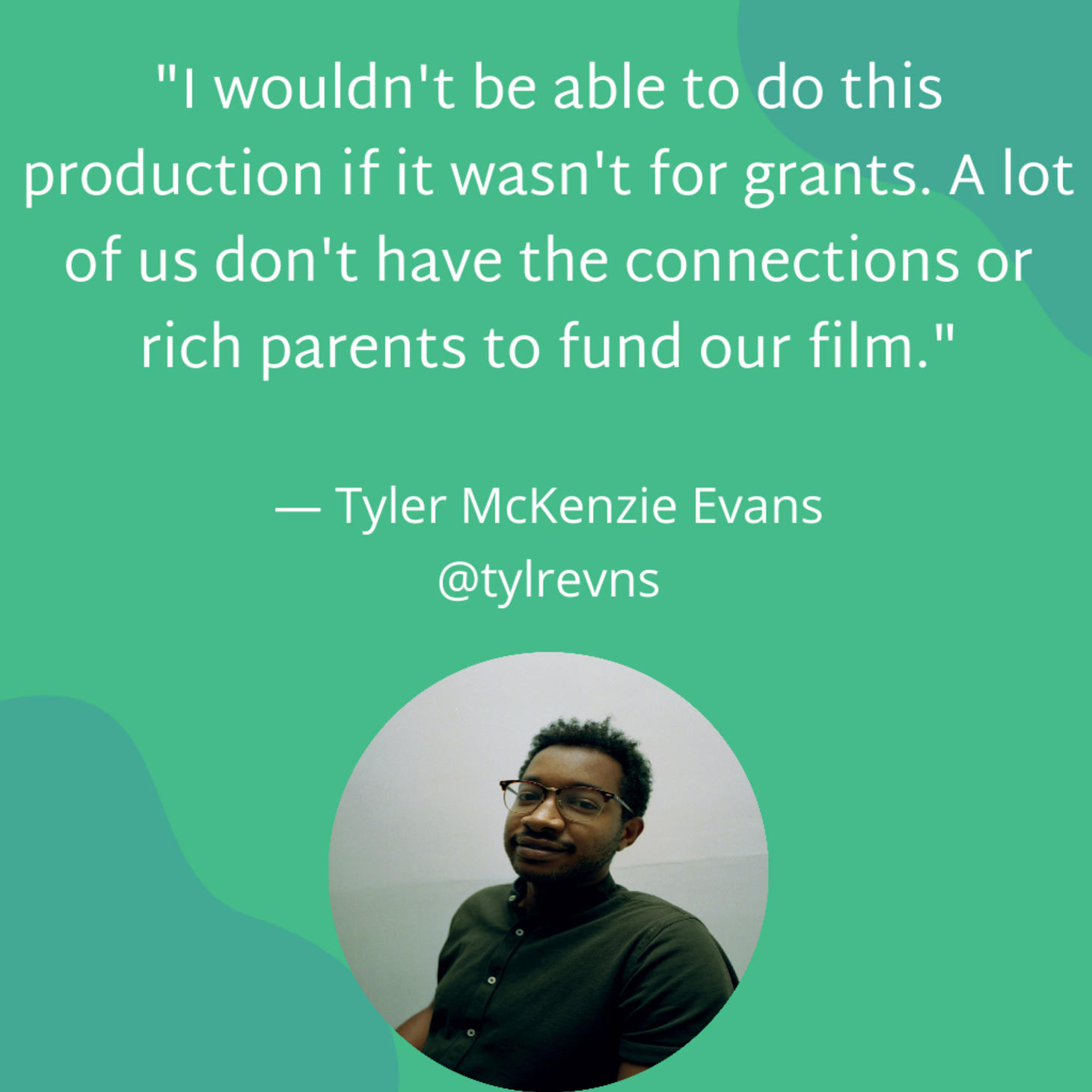
The Grant Systems That Makes It Possible
Evans, a 2023 TIFF Filmmakers Lab alumni, is grateful for the grants and in-kind support he received for Sea Star from Canada Council for the Arts, Ontario Arts Council, Toronto Arts Council for Black Arts Projects and OYA Black Arts Coalition.
"I wouldn't be able to do this production if it wasn't for grants. I think a lot of voices would be gone if it weren't for these council grants, including mine. It's very expensive being a filmmaker, especially as a BIPOC person. A lot of us don't have the connections or rich parents to fund our film. We rely on these grants to help us build our portfolio and build into the next thing."
His producer, Malachi Ellis, is a graduate of the OYA program. Ellis brought program participants onto the set as crew members, giving them hands-on experience. Evans says,
“My producer Malachi actually was a graduate from that program. He brought a few of those students on set for Sea Star".
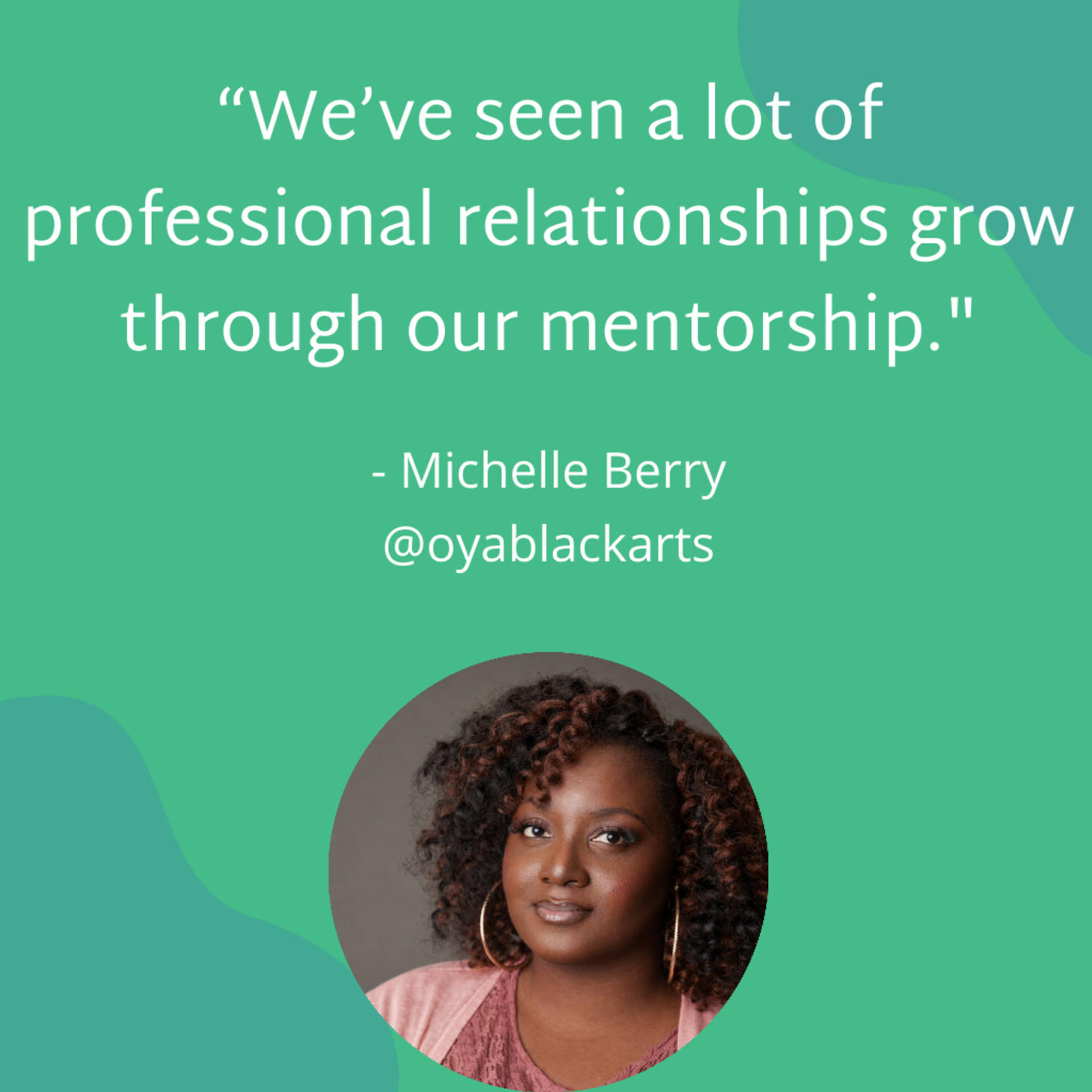
Community Support
The OYA Black Arts Coalition provided in‑kind support for the production, including crew, equipment, and space, allowing the short film to get finished with resources and metorship.
Program manager Michelle Berry said OYA prioritizes connecting participants with mentors who are actively working in the industry.
“Those are the types of people we like to put our participants in front of and have them mentored by,” she said.
Berry said that relationships often continue after the program and turn into lasting professional connections.
“We’ve seen a lot of professional relationships grow through our mentorship,” she said.
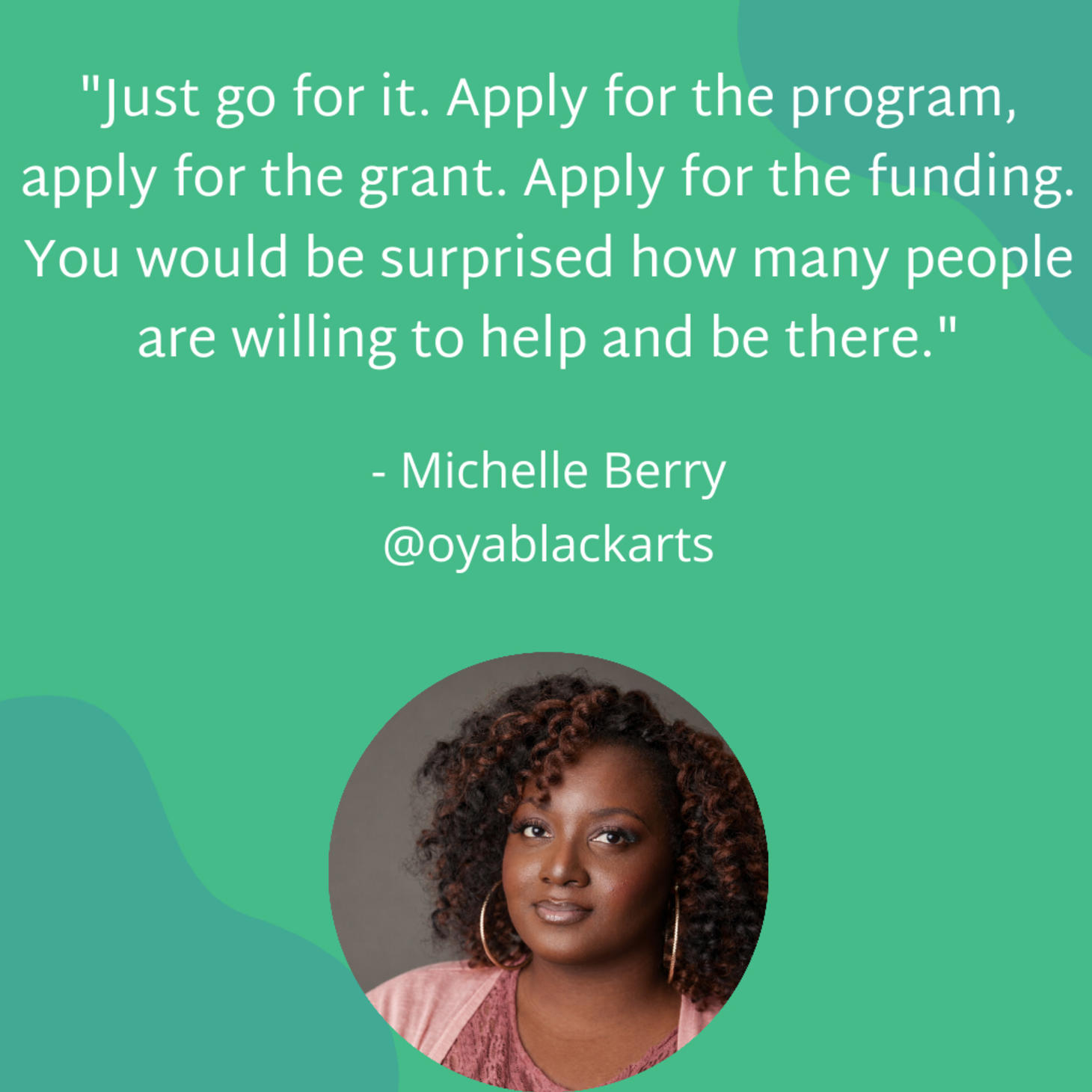
Advice to BIPOC Creators
As diversity, equity, and inclusion initiatives shrink, essential support from government and community organizations allows creators like Evans to make films that reflect complex realities in communities that are historically ignored in the mainstream.
For Berry, supporting marginalized creators is necessary in an industry where rejection is the norm and opportunities feel far out of reach.
Berry's advice to emerging marginalized creatives is direct:
“Just go for it. Apply for the program, apply for the grant, apply for the funding." She emphasizes that support exists beyond what many realize. "You would be surprised how many people are willing to help and be there”.
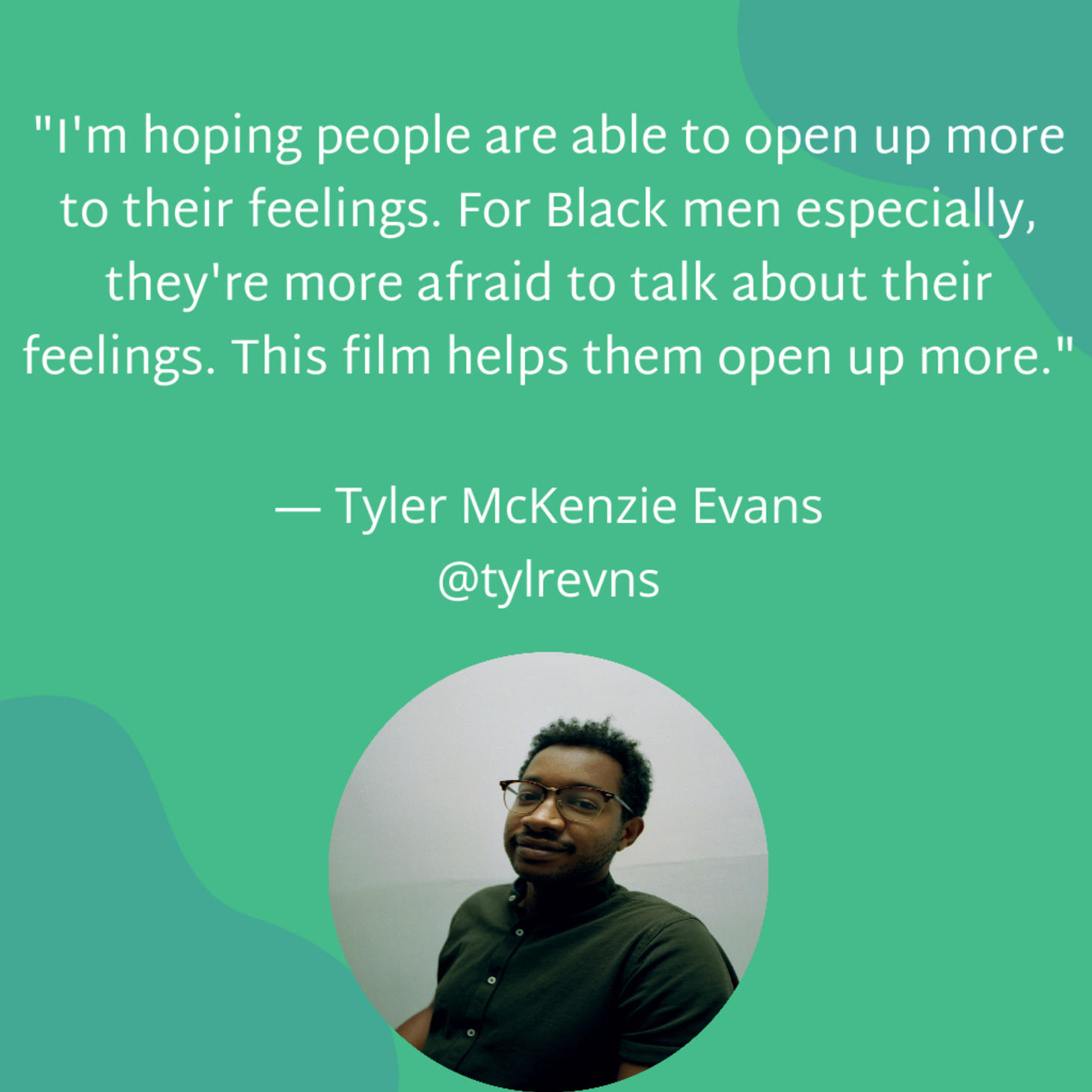
From Personal Story to Community Healing
Sea Star arrives amid growing conversations about Black health equity and swimming access. Projects like Black Canadian Pool Histories document how historical exclusion from pools and beaches continues to shape Black communities’ relationship with water.
Organizations across Ontario are working to address these disparities. The Breaking Barriers in Swimming Program and Afropolitan Canada offer culturally relevant swim lessons that prioritize safety, belonging, and resilience. These programs provide opportunities for communities to safely engage with water, confront inherited trauma, and heal.
Sea Star feels both urgent and deeply personal. It reminds viewers that small, intentional steps like entering a pool for the first time reflect courage, healing, and the possibility of reclaiming spaces once marked by exclusion. While the film portrays one person's journey, it also points toward broader systemic and community solutions.
Evans wants Sea Star to remind audiences that healing is both personal and collective. He says,
"I'm hoping people are able to open up more to their feelings. For Black men especially, they're more afraid to talk about their feelings. This film helps them open up more."
Faith Tabladillo is a journalism student at MacEwan University in Edmonton, Alberta, with interests in politics, technology, finance, and community reporting.
Resources and Community Connections
Film & Arts Funding
- OYA Black Arts Coalition
- Canada Council for the Arts
- Ontario Arts Council
- Toronto Arts Council
- TIFF Filmmakers Development
Swimming Access & Community Programs
- YMCA Canada
- Afropolitan Canada
- Breaking Barriers in Swimming Program
- Inclusion in Canadian Sport Network
Research & Health Equity
QUICK HITS
📊🚫 90% back social media ban for Canadian kids: A new poll shows 90% of Canadians support strict age limits, but advocates urge caution. While the public wants action, experts warn that bans might not be the silver bullet for online safety. Unpublished.ca. Read Here
📱💰 For Olympians, likes are the new currency: Thanks to relaxed IOC rules, Canadian athletes are turning to social media to fund their Milan Cortina dreams. It’s not just about training anymore—it’s about content. While some thrive on building a brand, others find the pressure to post a heavy distraction from the podium. The Globe and Mail. Read Here
📞🛑 Racist voicemail goes viral, sparking probe by a Toronto Catholic board: Two teachers are on leave after accidentally recording themselves making racist remarks on a voicemail left for a Black parent. The audio circulated widely on social media, triggering outrage and an investigation. CBC News. Read Here
🏛️⚖️ Mark Zuckerberg testifies in landmark trial over teen mental health: The Meta CEO faced questioning as plaintiffs argue Instagram was designed to be addictive and harmful to young users. Zuckerberg acknowledged Meta should have improved age verification sooner. The trial could force major platform changes and substantial payouts. The Guardian. Read Here
📱🚫 Instagram CEO denies users can be "clinically addicted" to social media: Adam Mosseri testified that heavy Instagram use is "problematic" rather than addictive, comparing it to watching too much TV. His comments came during a trial where families argue social platforms were designed to hook young users, worsening mental health issues. PBS NewsHour. Read Here
EVENTS 📅

📚 February 20, 6:30-8:30PM ET: The Black Artist Residency (BAR). Information session on current BAR artists to learn more about their art practices and take in their works in progress! 7-month artist residency. Emerging to mid-career Black Artists. LSA’s newly-created artist studios, 2422 Lake Shore Blvd. W. (2nd Floor). Details here
📚 February 25, 12:00 PM ET: Toronto Arts Council hosts Grants Information Session: Literary Projects. Learn how to fund your next poetry reading or storytelling event. Register here.🎨
🎨 February 25, 2026: West Toronto Collective Exhibition – The Colours That Tie Us. Call for artists of all generations from West Toronto to submit vibrant, playful, joyful works celebrating the 50th anniversary of Etobicoke Civic Centre. Reflects creativity, community, and connection across generations. Details here.
🎨 February 28, 2026: Lakeshore Art Trail – Call for New Artists, 25th Anniversary. Local visual artists invited to apply for October 17-18, 2026 show in Mississauga villages of Clarkson, Port Credit, and Lorne Park. Display/sell work at this historic milestone event. Jury results March 16, 2026. Details here.
💼 March 4, 2026, 11:59 PM ET: The LSA’s new professional development workshop series, Artists in Practice: Training in Community Arts Facilitation is a six-week program designed to support emerging artists, arts & culture workers and any artful individuals who are residents of Etobicoke and interested in arts facilitation at the intersection of creativity and community building. Registration ends in March. Details here
📚 March 4, 2026 - 2:00 PM - 3:00 PM ET: Ontario Creates hosts 2nd Grants Information Session: IP Fund – Linear Content stream supports Development and Production phases for feature film (drama and documentary) and digital series. Register here.
🎬 March 4, 7:30 PM ET: Mixed Company Theatre presents their production of I Carry With Me a play that looks at the differences and commonalities in what we carry as human beings from different racial and cultural backgrounds, at The Experience Centre, 240 The East Mall. Details here
📚 March 5, 2:00-3:00 PM ET: Ontario Creates hosts Grants Information Session: IP Fund – Interactive Content stream. Pre-Production and Production phases for video games and XR content. Details here.
🎨 March 7, 12:00 PM ET: Partnering with the Image Centre of TMU, East End Arts is supporting a Polaroid Emulsion Workshop for youth ages 15-25! Come learn the hands-on techniques of transferring their image emulsion onto another material surface, such as: paper, fabric, wood or stone with support from guest artist Marzieh Miri. The workshop will be at St. Matthew’s Clubhouse, 450 Broadview Ave. and registration closes on March 1st, 2026 at 11:59 PM. Only 10 spots are available with a 50$ Honorarium. Details here
FUNDS FOR CREATORS

Grants & Opportunities: February 2026
Regardless of what type of creator you are, the right funding and programs can make all the difference. That's why we started curating grants, programs, and opportunities specifically for content creators of color in the Toronto region. We do the research so you don't have to because we know you're already juggling a lot.
City of Mississauga - Call for submissions: Poet Laureate 2026-2028
The City of Mississauga will recognize its sixth Poet Laureate in 2026. The role of the Poet Laureate is to elevate the status of poetry, literary arts and writers within their communities and beyond. This honorary position recognizes a poet who writes excellent poetry or spoken word and has written on themes that are relevant to the citizens of Mississauga. Candidates must be current Mississauga residents. Prize, Honorarium: 10000$ Deadline for submission: February 25, 2026 More information
CBC Nonfiction Prize Now Open
The Nonfiction Prize includes memoir, biography, humour writing, essay (including personal essay), travel writing, and feature articles. While the events must be real and the facts true, creative nonfiction conveys your message through the use of literary techniques such as characterization, plot, setting, dialogue, narrative and personal reflection. The work should be accessible to a general reading audience (i.e., not written for a specialized or academic audience). A fee of $25.00 (taxes included) for administration purposes is required for each entry. Make sure to read the complete rules and regulations before submitting here. Prizes: For the first place: $6,000, a two-week writing residency at Banff Centre for Arts and Creativity and their work published on CBC Books. Four finalists each receive $1,000 and their work is also published on CBC Books. Deadline: March 1st, 4:59pm ET Apply here
Toronto Arts Council - Theatre Projects Program
The Theatre Projects program is designed for professional, non-profit theatre groups, organizations and collectives for the creation, production and presentation of theatre works and complementary initiatives that promote the development of professional theatre in Toronto. Prizes: up to 20000$ Deadline: March 2, 2026, 11:59 ET. Apply here
Ontario Arts Council - Media Arts Project
The program supports not-for-profit organizations and ad hoc groups, collectives that present, document or spread the work of professional Ontario media artists, or that provide media artists with professional development opportunities. The program has three categories: Presentation, Professional Development and Publication. To be eligible, the interested organization must show evidence of media arts expertise through the Arts Professionals directly involved in the project, or through the expertise of an advisory committee of media arts professionals. Prize: 15000$, Deadline: March 3rd, 1:00pm ET. Apply here
TO Live explorations grant: Feeding the creative process
The explorations initiative supports Toronto-based artists, from across all disciplines, who want to push their boundaries. Seven artists will be selected to research and explore their idea free from the pressure of predetermined outcomes, to feed their artistic ambitions. TO Live’s explorations initiative is made possible by supporters of the TO Live Foundation and is generously supported by Power Corporation of Canada. Prize:7000$ Deadline: March 9, 2026 at 5:00 PM ET. Apply here
Ontario Arts Council - Multi and Inter-Arts Projects
The program aims to fund the creation, production and showcasing of multi- and inter-arts activities by professional Ontario artists, ad hoc groups, collectives and organizations working with artists in all art forms and initiatives that positively impact the professional multi- and inter-arts community. Prize: up to 20000$ Deadline: March 12, 11:59 ET. Apply here
WE ❤️ FEEDBACK 📋
What'd you think of today's issue? 👂
💫 You need to take it up a notch
Spinning Forward is an award-winning, trusted, local, independent media company that informs, engages, and uplifts creators of color aged 16 to 34 in the Toronto area. Flavian DeLima (LinkedIn), the founder and publisher, launched Spinning Forward to help level the playing field for creators of color.
CONTRIBUTORS
John Tse, Yusuf Sipahi, Faith Tabladillo and Humelah Nelson.
If you like this issue, please share it with a few friends. To view all past issues on the Web, go here
If you want to be featured, have a comment or want to suggest a topic or creator, reply to this email or click here or the "Suggest a link" at the bottom of any issue.
For questions, comments or sponsorships, reply to this email or email info at spinningforward dot com.

COMMENT 💬
Hey there,
In this issue, we explore the relationship Black men have with water through film director and writer, Tyler McKenzie Evans' newest short film, Sea Star. The film was inspired by a conversation with his dad. His dad put his sons into swimming lessons but never learned how to swim himself. Black adolescents are seven times more likely to drown in public pools than their white peers.
Toronto based academic, Jacqueline L. Scott, argues that no knowing how to swim isn't only about lacking skills but that it's tied to racial and economic inequality, and to trauma.
Quick Hits:
💸 90% back social media ban for kids: Public supports age limits; experts warn it won't solve safety.
🏅 Olympians monetize social media: Canadian athletes fund Milan Cortina dreams through platforms.
📢 Racist voicemail goes viral and sparks probe: Toronto Catholic board investigates two teachers' remarks.
⚖️ Zuckerberg admits Instagram flaws: Meta CEO acknowledges addictive design.
📱 Instagram CEO denies addiction: Mosseri argues heavy use is "problematic."
Funding and Events: Check out grants and programs in the Funds for Creators section and Upcoming Events.
Reading Time: 5 minutes
If you want to get in touch, reply to this email or email info at spinningforward.com
Flavian DeLima
Publisher & Editor, Spinning Forward